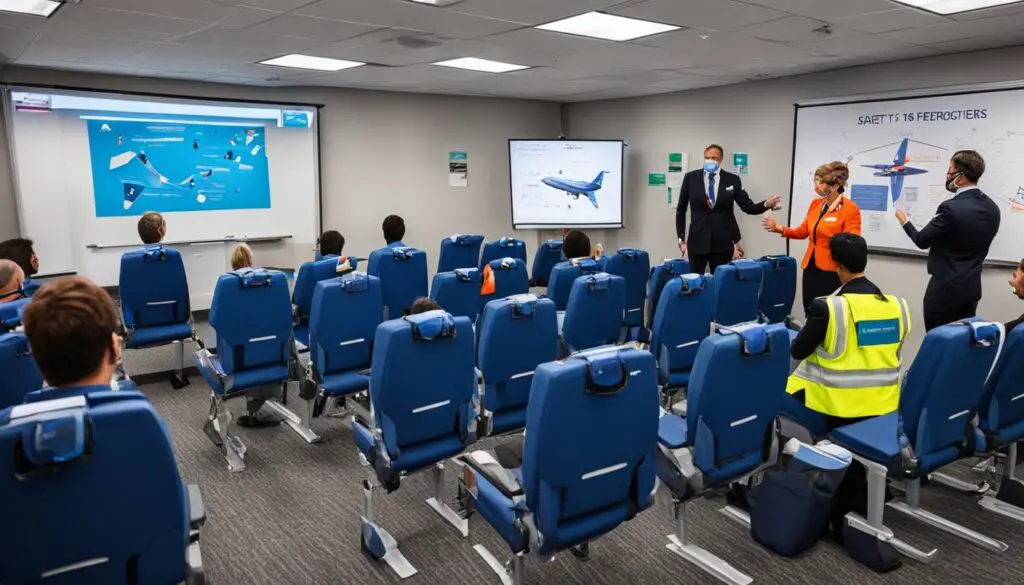
Flight attendant training is essential for individuals who want to pursue a career in aviation. This training prepares individuals for serving passengers and ensures their safety during flights. A flight attendant needs to be able to think on their feet and handle a range of situations quickly and calmly. They need to be efficient and friendly, provide excellent customer service, and manage passengers’ queries and doubts.
Besides these attributes, Flight Attendant Training provides the gateway to explore various glamorous destinations worldwide, and if you love working with people and cherish an exotic travel lifestyle, this job is the epitome of glamour and excitement.
Join us for a journey exploring flight attendant training and the wide-range of opportunities available in this exciting profession.
Understanding the Flight Attendant Job Profile
Flight attendants play a crucial role in ensuring the safety and comfort of passengers onboard. Their job profile involves a range of responsibilities and tasks that require exceptional customer service skills, crisis management abilities, and attention to detail.
As part of their job, flight attendants must greet passengers, conduct safety briefings, and ensure that passengers comply with safety regulations. They must also serve food and beverages, assist with baggage and boarding, and attend to the needs of passengers during the flight. In case of an emergency, flight attendants must be ready to handle situations calmly and professionally.
Flight attendants’ primary task is to ensure passenger safety, including the safety of the flight, and they must be prepared to handle any unforeseen circumstances that may arise. They must also provide excellent customer service to passengers, which often means going above and beyond what is expected.
Overall, the flight attendant job profile demands a unique combination of skills, including impeccable communication, time management, and multitasking capabilities. It requires individuals who can remain calm in high-pressure situations and are dedicated to providing exceptional customer service throughout the flight.
Entry Opportunities and Demand in the U.S.
If you’re interested in becoming a flight attendant, the United States offers a range of entry opportunities in the aviation industry. Major U.S. airlines often host recruitment drives to hire flight attendants, while independent training centers offer programs that prepare aspiring flight attendants for the profession.
Additionally, the demand for flight attendants in the U.S. is expected to grow in the coming years, as the aviation industry recovers from the effects of the pandemic. According to the Bureau of Labor Statistics, employment of flight attendants in the U.S. is projected to increase 17 percent from 2019 to 2029, which is much faster than the average for all occupations.
The U.S. aviation industry is highly competitive, with thousands of applicants vying for a limited number of positions. Therefore, it’s essential for aspiring flight attendants to have excellent communication skills, customer service experience, and a passion for travel to stand out from the crowd.
Exploring Flight Attendant Opportunities in Europe
Europe is home to some of the world’s most prominent airlines and aviation companies, which has created numerous job opportunities for individuals pursuing a career as a flight attendant.
The aviation industry in Europe has experienced steady growth over the years, with an increasing number of passengers taking to the skies each year. As a result, airlines are constantly looking for qualified and experienced flight attendants to join their teams.
One of the significant benefits of working as a flight attendant in Europe is the opportunity to travel to some of the continent’s most stunning destinations. Furthermore, flight attendants can develop their customer service and communication skills, which are highly valued in the aviation industry.
The demand for flight attendants in Europe varies between countries and airlines, with some airlines offering more opportunities than others. For instance, international airlines such as Emirates and Qatar Airways offer numerous opportunities for flight attendants, while national airlines like British Airways and Lufthansa have more selective hiring processes.

Flight Attendant Employment Prospects in Europe
| Airline | Country | Hiring Requirements |
|---|---|---|
| Air France | France | Fluency in French; previous customer service experience; |
| Ryanair | Ireland | Fluency in English; high school diploma; |
| Vueling | Spain | Fluency in Spanish and English; minimum height requirement of 1.55m; |
| SAS | Scandinavia | Fluency in one Scandinavian language and English; previous customer service experience; |
As the air travel industry bounces back from the pandemic, more employment opportunities for flight attendants are expected to arise in Europe.

Flight Attendant Opportunities in Other Regions
While demand for flight attendants is high in the United States and Europe, opportunities also exist in other regions. Countries in the Middle East, such as Qatar, the United Arab Emirates, and Saudi Arabia, have a thriving aviation industry and often require international flight attendants. Additionally, China and Southeast Asian countries like Indonesia and Thailand have a rapidly growing demand for flight attendants due to the expansion of their aviation sectors.
As the global demand for air travel increases, flight attendants are needed in all parts of the world. Pursuing a career in this field provides opportunities to travel and experience different cultures while making a difference in the lives of passengers.
Top Countries with High Demand for Flight Attendants
| Country | Region |
|---|---|
| Qatar | Middle East |
| United Arab Emirates | Middle East |
| Saudi Arabia | Middle East |
| China | Asia |
| Indonesia | Asia |
| Thailand | Asia |
Flight Attendant Training and Studies
Flight attendants are trained professionals responsible for passengers’ safety, comfort, and well-being during a flight. To become a flight attendant, individuals must undergo rigorous training and education to acquire the necessary skills. Both airlines and independent training centers offer various training programs that cover different aspects of the job profile.
Training courses cover various topics such as aviation regulations, emergency procedures, customer service, and aviation terminology. Additionally, flight attendant aspirants receive training on situational awareness, conflict resolution, and teamwork. These skills help them to diffuse conflicts and manage emergency situations with ease.
Training programs often include a mix of classroom instruction, simulated exercises, and on-the-job training that replicates real-life scenarios. The training programs usually vary in duration and required hours of flight experience. Airlines usually require a high school diploma or equivalent, fluent speaking and writing skills in English, and excellent customer service skills.
As the aviation industry is ever-evolving, it is essential to stay updated with the latest technology and procedures through ongoing professional development courses. These courses are aimed at upgrading and refreshing the skills of flight attendants and can lead to better career prospects.
In summary, becoming a flight attendant requires a combination of soft and technical skills that can be acquired through rigorous training programs and ongoing professional development.
Navigating the Flight Attendant Job Application Process
For those seeking a career as a flight attendant, the job application process can be daunting. However, with proper preparation, applicants can increase their chances of landing their dream job. Here are some tips to guide aspiring flight attendants through the application process:
- Prepare a well-crafted resume: Highlight relevant experience and skills such as customer service, first aid certification, and foreign language proficiency. Make sure to tailor your resume to the airline you’re applying to.
- Write a compelling cover letter: Use this opportunity to showcase your passion for the aviation industry and customer service. Also, explain how your skills and experience make you a valuable candidate for the job.
- Research the airline: Understanding the airline’s culture, values, and mission can give you an edge during the interview process. Take the time to research the airline and its history before applying.
- Prepare for the interview: Practice answering common interview questions and have examples ready that demonstrate your customer service skills and ability to handle challenging situations.
- Explore different employers in the aviation industry: Applicants should consider all options available to them and not limit themselves to a single airline. Other employers in the aviation industry include private jet companies, charter flight companies, and corporate aviation departments.
By following these tips, applicants can increase their chances of standing out from the competition and landing a flight attendant job with their desired employer.

Flight Attendant Opportunities in Various Sectors and Industries
Flight attendants are not limited to working in commercial airlines alone. There are a variety of sectors and industries that require their services. Here are a few examples:
| Sector/Industry | Description |
|---|---|
| Private Aviation | Flight attendants may work on corporate jets, private planes, or helicopters. They cater to high net worth individuals, celebrities, and executives with exceptional customer service. |
| Charter Flights | Flight attendants may work for charter companies that provide on-demand service to clients who need to travel at short notice. |
| Cruise Lines | Flight attendants may work on cruise ships as part of the hospitality crew, catering to guests with services such as food and beverage, cabin cleaning, and leisure activities. |
| Showbiz | Flight attendants may have the opportunity to work with production companies, ensuring that the cast and crew of a movie or television show receives the level of service they require while flying to sets in various locations. |
These are only a few examples of the many exciting sectors and industries in which flight attendants can utilize their skills. The adaptability and versatility of flight attendants make them a valuable asset in any sector or industry requiring excellent customer service and hospitality.
Compensation, Development Opportunities, and Promotion Prospects
Flight attendant salaries vary depending on experience, qualifications, and employer, but the Bureau of Labor Statistics reports that the median annual salary for flight attendants was $57,390 in May 2020. Additionally, many airlines offer employee benefits such as health insurance, retirement plans, and travel perks for you and your immediate family.
The flight attendant profession offers numerous opportunities for growth and development. Flight attendants can advance into leadership roles, such as senior flight attendant or lead flight attendant. Other areas for career advancement include training, recruitment, or management positions within the airline industry.
If you wish to take on a leadership role within the airline, additional certifications and training programs may be required. Pursuing advanced education and training in areas such as airline management or aviation safety may help you stand out as a candidate for promotions.
Conclusion
Flight attending training is a gateway to an exciting career in the aviation industry. This profession demands a unique set of skills, including excellent communication, problem-solving ability, and adaptability. Flight attendants must also be able to work efficiently under pressure and possess a passion for customer service.
Individuals interested in a career in aviation and customer service might also consider pursuing similar jobs such as customer service representative, tour guide, or event coordinator. Each of these professions demands skills similar to those of a flight attendant, such as attention to detail and exceptional communication.
Flight attending in various sectors and industries offers lucrative compensation, employee perks, and numerous growth opportunities. With the right skills and training, flight attendants can advance in their profession and take on leadership roles.
The demand for flight attendants will continue to grow, with a projected increase in air travel worldwide. It is an excellent time to consider pursuing a career in this special profession that offers travel opportunities and a chance to make a positive impact on passengers’ lives.
Questions and Answers
What is the importance of flight attendant training?
Flight attendant training is crucial as it equips individuals with the necessary skills and knowledge to ensure passenger safety and provide excellent customer service onboard. It covers areas such as emergency procedures, first aid, hospitality, and security protocols.
What are the responsibilities of a flight attendant?
Flight attendants play a vital role in ensuring passenger comfort and safety during flights. Their responsibilities include conducting pre-flight safety checks, demonstrating safety procedures, serving meals and beverages, addressing passenger needs, and assisting during emergencies.
What are the entry opportunities for aspiring flight attendants in the U.S.?
Aspiring flight attendants can enter the profession through various pathways. They can apply directly to airlines or attend flight attendant academies. Some airlines may require prior customer service experience, while others provide comprehensive training programs for new hires.
What is the demand for flight attendants in the United States?
The demand for flight attendants in the U.S. remains steady, with airlines continuously hiring to meet the needs of expanding routes and passenger volumes. The industry offers a wealth of opportunities for those seeking to embark on a career as a flight attendant.
What are the flight attendant opportunities like in Europe?
Europe offers a diverse and vibrant aviation industry with numerous opportunities for aspiring flight attendants. From large international carriers to regional airlines, there is a demand for skilled professionals who can meet the needs of a diverse range of passengers.
Are flight attendant opportunities available in regions outside of the U.S. and Europe?
Yes, flight attendant opportunities exist in various regions worldwide. Countries such as the United Arab Emirates, China, and Australia, among others, have a high demand for flight attendants due to their growing aviation industries and expanding airline networks.
What training and studies are required to become a flight attendant?
To become a flight attendant, individuals typically undergo specific training programs. These can be provided by airlines themselves or independent training centers. The training covers topics such as safety procedures, emergency protocols, passenger service, and cultural awareness.
How does one navigate the flight attendant job application process?
To navigate the flight attendant job application process successfully, it’s important to prepare a professional resume, write a compelling cover letter, and research potential employers. Once invited for an interview, practicing good communication skills and demonstrating a passion for customer service can help set candidates apart.
In which sectors and industries can flight attendants work?
Flight attendants can work in various sectors and industries related to aviation. They can find opportunities in commercial airlines, private aviation, charter flights, corporate aviation, and even on yachts and cruise ships. The versatility of the profession allows for diverse career paths.
What is the compensation and development potential for flight attendants?
Flight attendants receive competitive compensation packages that often include salary, benefits, and discounts on flights. There are ample opportunities for career development and growth within the profession, including the chance to take on leadership roles, become trainers, or move into management positions.
What skills are required for success as a flight attendant?
Flight attendants should possess excellent communication and customer service skills, the ability to remain calm under pressure, problem-solving abilities, adaptability, and cultural sensitivity. They must also be physically fit and able to work irregular hours and handle the demands of air travel.
What are some similar jobs and professions to consider within the aviation and customer service fields?
Some similar jobs and professions within the aviation and customer service fields include airline customer service agent, airport operations agent, airline cabin crew supervisor, in-flight service manager, and hospitality roles within the travel and tourism industry.

